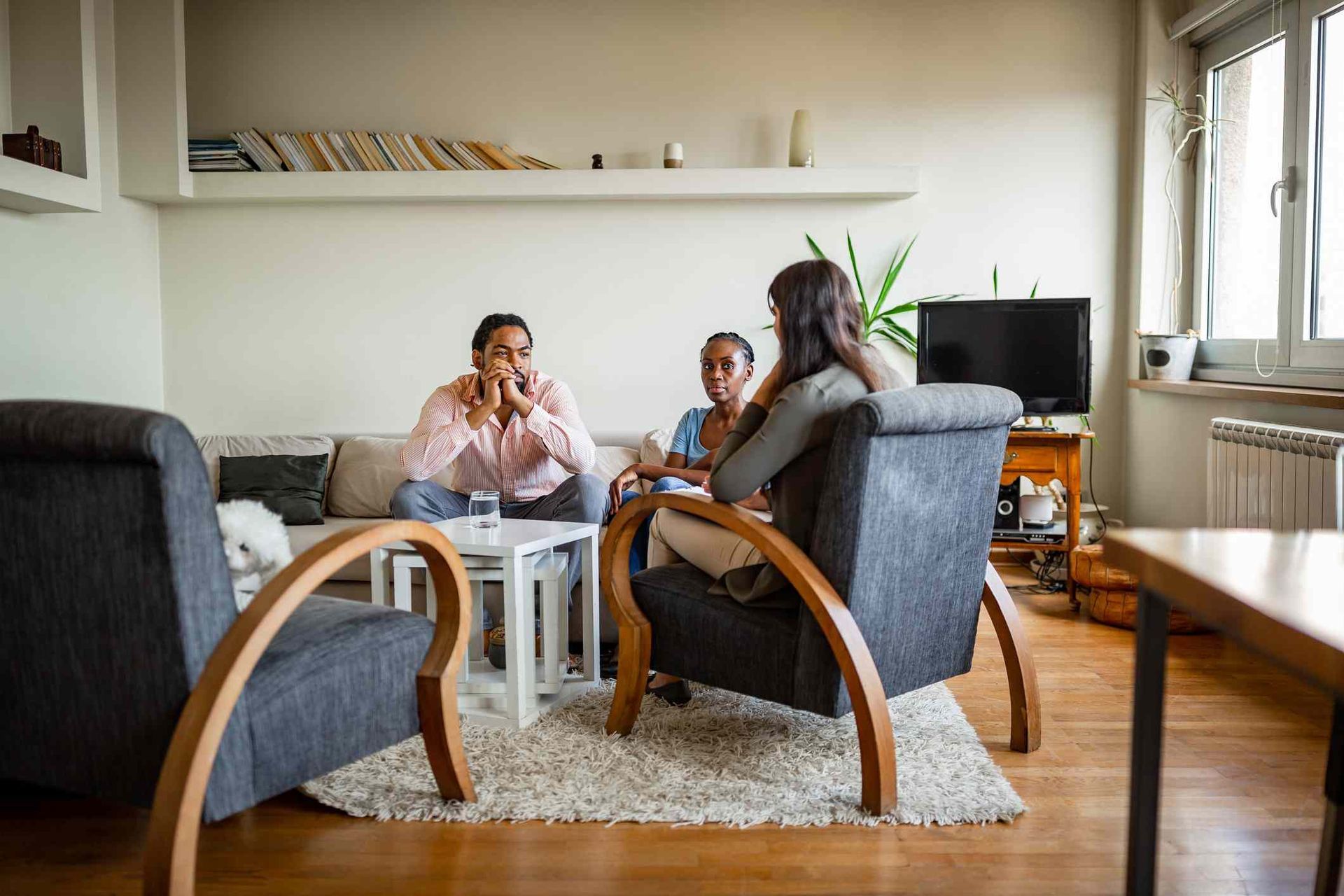Free initial consultations! Call now: (405) 921-7012
Couples Therapy Tips for Navigating Relationship Challenges Together

Relationships are complex, and even the strongest couples face challenges from time to time. While it’s normal for relationships to go through ups and downs, navigating those challenges together can strengthen the bond between partners. Couples therapy is a valuable resource that helps couples work through issues and build healthier, more fulfilling relationships. In this blog, we’ll share couples therapy tips that can guide you through the process of managing relationship challenges together.
Whether you’re just beginning therapy or are considering it as an option, these insights can help you understand how to approach therapy, what to expect, and how to make the most out of your sessions
What is Couples Therapy?
Couples therapy is a type of therapy designed to help couples improve their communication, resolve conflicts, and strengthen their relationships. A professional therapist works with both partners to identify the root of the issues and offer solutions that foster understanding and connection.
It’s important to know that therapy for couples isn’t just for those facing serious problems. It can also be beneficial for couples who want to improve communication or work through minor conflicts. Whatever the reason, couples therapy provides a neutral space where both partners can express themselves freely
Why Couples Therapy is Important
Many couples wait too long before seeking help, often believing that they can fix things on their own. Unfortunately, by the time they reach out for therapy, the issues may have already caused significant damage to the relationship. Therapy helps couples address problems early and develop tools to prevent them from escalating.
Key benefits of couples therapy include:
- Improved Communication: Learn how to express your thoughts and feelings more effectively.
- Conflict Resolution: Discover healthier ways to handle disagreements without resentment.
- Strengthened Emotional Bond: Rekindle the emotional connection that may have weakened over time
1. Identify the Core Issues
One of the most crucial steps in couples therapy is identifying the core issues that are causing tension. Often, couples argue over surface-level problems like chores, finances, or time management, but these issues might be masking deeper concerns such as unmet emotional needs or lack of trust.
How to Approach This:
- Make a list of recurring arguments or disagreements.
- Reflect on the underlying emotions tied to these issues—are you feeling neglected, unsupported, or misunderstood?
- Discuss these insights openly with your partner during therapy sessions.
By recognizing the root causes of your challenges, you and your therapist can work on addressing them directly rather than focusing solely on the symptoms.
2. Effective Communication is Key
One of the most common reasons couples seek therapy is communication breakdown. Often, partners feel unheard or misunderstood, which can lead to frustration and resentment. Learning how to communicate effectively is essential for relationship health.
Couples Therapy Tips for Better Communication:
- Practice Active Listening: This involves fully focusing on your partner’s words without interrupting. Show empathy and reflect back what they’re saying to ensure understanding.
- Use “I” Statements: Instead of saying, “You never listen,” try framing it as, “I feel unheard when I talk to you.” This reduces blame and encourages more open dialogue.
- Stay Present: Avoid bringing up past conflicts during discussions. Focus on the issue at hand to prevent overwhelming the conversation.
When couples communicate openly and respectfully, they’re more likely to resolve conflicts without long-lasting damage.
3. Work Together on Conflict Resolution
All couples argue, but how you handle those disagreements makes all the difference. In therapy, you’ll learn strategies for resolving conflicts without damaging your relationship. Many people fall into the trap of trying to “win” arguments, but this often leads to deeper divides.
Conflict Resolution Strategies:
- Pause and Reflect: Take a moment to cool down before responding in the heat of an argument. A calm mind helps in addressing issues more constructively.
- Focus on Solutions, Not Blame: When addressing problems, shift the focus from who’s at fault to how the issue can be resolved.
- Agree to Disagree: Not all issues have a perfect solution. Sometimes, it’s okay to accept that you and your partner have different perspectives.
Therapy provides a safe space for partners to practice these skills and learn how to approach conflicts in a healthier way.
4. Set Realistic Expectations
Relationships are not perfect, and neither are people. Setting realistic expectations about therapy and your partner is vital. Couples therapy tips often emphasize the importance of patience and understanding throughout the process.
Managing Expectations in Therapy:
- Progress Takes Time: Don’t expect all your problems to be solved overnight. Therapy is a process that requires commitment from both partners.
- Understand Your Partner’s Perspective: You may not always agree with your partner’s views, but understanding them is essential for growth.
- Celebrate Small Wins: Recognize the progress you’re making, no matter how small. This can help maintain motivation and positivity throughout the journey.
By keeping your expectations grounded, therapy becomes a more manageable and less overwhelming experience.
5. Focus on Rebuilding Trust
Trust is the foundation of any strong relationship. When that trust is broken—whether due to dishonesty, infidelity, or other breaches—healing can be difficult. Therapy can provide a structured environment to rebuild trust slowly and methodically.
Steps to Rebuild Trust:
- Be Transparent: Honesty and openness are essential when working to regain trust. Keep communication lines open and be willing to answer difficult questions.
- Take Responsibility: If you’ve broken your partner’s trust, acknowledge your actions and express genuine remorse.
- Be Patient: Trust takes time to rebuild. Both partners must be willing to give the process time and not rush healing.
Restoring trust requires consistent effort and commitment from both partners, but it’s a vital part of repairing a relationship.
6. The Financial Side of Couples Therapy
Many couples wonder about couples therapy costs before committing to the process. Therapy is an investment in your relationship, and while costs may vary based on location and therapist experience, the value it brings can far outweigh the financial expense.
Factors Affecting Couples Therapy Costs:
- Therapist's Experience: More experienced therapists may charge higher rates due to their expertise.
- Location: Urban areas tend to have higher therapy rates than rural locations.
- Duration and Frequency: Some couples may need more frequent or longer sessions, which can increase costs.
While couples therapy costs might seem high, consider it an investment in your relationship’s future. Many therapists also offer payment plans or sliding scales to accommodate different budgets.
Conclusion
Navigating relationship challenges is never easy, but with the right tools and guidance, couples can emerge stronger and more connected. By embracing couples therapy tips, improving communication, resolving conflicts, and rebuilding trust, you can overcome hurdles together. Therapy is not just about fixing problems but also about deepening your emotional bond and creating a more fulfilling relationship. If you’re considering therapy for couples, don’t hesitate to take that step and invest in a healthier, happier future together.
For more information about couples therapy and how it can benefit your relationship, reach out to Brian Stalcup MED at brianjstalcup@gmail.com or call 405-921-7012 to learn more about our therapy services.
Frequently Asked Questions
-
1. What are some key couples therapy tips for improving communication?
Effective communication is essential in any relationship. Some top couples therapy tips include practicing active listening, using “I” statements to express feelings without blaming, and focusing on the issue at hand rather than past conflicts. These strategies help build a healthier dialogue between partners.
-
2. How can therapy for couples help us resolve conflicts?
Therapy for couples provides a safe space to work through conflicts with the guidance of a professional therapist. Couples can learn healthy conflict resolution techniques, such as compromising, staying calm during disagreements, and focusing on problem-solving instead of blame.
-
3. Is couples therapy only for relationships in crisis?
No, therapy for couples is beneficial for all stages of a relationship. Whether you're facing a significant challenge or just want to improve your communication and connection, couples therapy can help you and your partner grow stronger together
-
4. What factors influence the cost of couples therapy?
The couples therapy cost can vary depending on the therapist's experience, location, and the length and frequency of sessions. Some therapists offer sliding scale fees or payment plans to make therapy more affordable. It's important to consider therapy as an investment in your relationship's health and future.
-
5. How long does it take for couples therapy to show results?
The timeline for seeing results from therapy for couples depends on the complexity of the issues and the couple's willingness to engage in the process. Some couples notice improvements after a few sessions, while others may need longer to fully resolve deeper issues. Patience and commitment are key to making progress.
Hours
- Monday
- -
- Tue, Thu
- -
- Wed, Fri
- -
- Saturday
- Appointment Only
- Sunday
- Closed
Quick Links
Services
Copyright © 2023 Brian Stalcup MED, All Rights Reserved.
